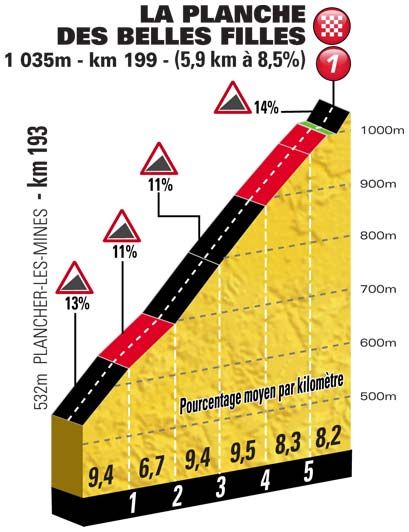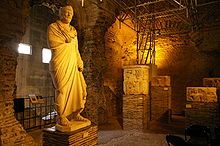The Tour de France 2012, the world’s premier cycling event kicked off last Saturday with the Prologue in Liège, Belgium and will conclude on July 22 with the traditional ride into Paris and laps up and down the Champs-Élysées. Over the next 22 days the race will take its course briefly along the Northwestern coast of France through Boulogne-sur-Mer, Abbeville and into Rouen then into the mountains of the Jura, Swiss Alps and the Pyrenees.
We will be Live Blogging Le Tour 2012 every morning at The Stars Hollow Gazette starting at 7:30 AM EDT. Come join us for a morning chat, cheer the riders and watch some of the most beautiful and historic countryside in Europe.
Stage 7 – Tomblaine – La Planche des Belles Filles. 199 km
Stage 7 start and finish were two new locales for Le Tour, the village of Tomblaine and a ski station on the last summit of the Vosges, La Planche des Belles Filles. The riders left the plains and began the rigorous part of the race into the mountains. The mountains in this stage are considered “medium” but the last leg to the summit finish is a category 1 mountain with the last 850 meter at a leg muscle screaming incline of 14%.
Today’s stage start and finish are two new locales for Le Tour, the village of Tomblaine and a ski station on the last summit of the Vosges, La Planche des Belles Filles.

Tomblaine
• Stage town for the first time
• 8,000 inhabitants
• Head of the canton of Meurthe-et-Moselle
 A new town on the Tour de France’s map, Tomblaine is situated in the sphere of influence of Nancy, where the peloton has been going since 1905. Fausto Coppi, Louison Bobet and Bernard Hinaul have been winners there, but the memory which is the freshest in our minds is that of Christophe Mengin’s bitter disappointment in the 2005 Tour. The stage’s regional rider had every opportunity to win, by joining the breakaway of the day, and then leaving his fellow riders behind him in the final stretch. The several second’s lead that he still had after the red pennant should have been enough, but he was caught out by the rain and the rider from Lorraine finished his route by crashing into the barriers on the edge of the last bend. Italy’s Lorenzo Bernucci took advantage of his bad luck.
A new town on the Tour de France’s map, Tomblaine is situated in the sphere of influence of Nancy, where the peloton has been going since 1905. Fausto Coppi, Louison Bobet and Bernard Hinaul have been winners there, but the memory which is the freshest in our minds is that of Christophe Mengin’s bitter disappointment in the 2005 Tour. The stage’s regional rider had every opportunity to win, by joining the breakaway of the day, and then leaving his fellow riders behind him in the final stretch. The several second’s lead that he still had after the red pennant should have been enough, but he was caught out by the rain and the rider from Lorraine finished his route by crashing into the barriers on the edge of the last bend. Italy’s Lorenzo Bernucci took advantage of his bad luck.
La Planche des Belles Filles
• Stage site for the first time
• The summit of the Vosges massive (1148 m) in Haute-Saône
 The only ski resort in the department of Haute-Saône and the last summit of the Vosges, La Planche des Belles Filles (English: Board of the pretty girls) is going to make a promising entrance among the Tour de France’s finish sites. Although the final slope seems to be reserved for the strongest climbers, this place takes its name from a collective and hopeless flight of the women of the valley, who wanted to escape from a massacre declared by the Vikings during their conquest in the 15 th century. The station’s name, according to legend, dates to 1635 when a Swedish soldier engraved an epitaph to some local girls who drowned whilst fleeing him and his men.
The only ski resort in the department of Haute-Saône and the last summit of the Vosges, La Planche des Belles Filles (English: Board of the pretty girls) is going to make a promising entrance among the Tour de France’s finish sites. Although the final slope seems to be reserved for the strongest climbers, this place takes its name from a collective and hopeless flight of the women of the valley, who wanted to escape from a massacre declared by the Vikings during their conquest in the 15 th century. The station’s name, according to legend, dates to 1635 when a Swedish soldier engraved an epitaph to some local girls who drowned whilst fleeing him and his men.





 A new town on the Tour de France’s map, Tomblaine is situated in the sphere of influence of Nancy, where the peloton has been going since 1905. Fausto Coppi, Louison Bobet and Bernard Hinaul have been winners there, but the memory which is the freshest in our minds is that of Christophe Mengin’s bitter disappointment in the 2005 Tour. The stage’s regional rider had every opportunity to win, by joining the breakaway of the day, and then leaving his fellow riders behind him in the final stretch. The several second’s lead that he still had after the red pennant should have been enough, but he was caught out by the rain and the rider from Lorraine finished his route by crashing into the barriers on the edge of the last bend. Italy’s Lorenzo Bernucci took advantage of his bad luck.
A new town on the Tour de France’s map, Tomblaine is situated in the sphere of influence of Nancy, where the peloton has been going since 1905. Fausto Coppi, Louison Bobet and Bernard Hinaul have been winners there, but the memory which is the freshest in our minds is that of Christophe Mengin’s bitter disappointment in the 2005 Tour. The stage’s regional rider had every opportunity to win, by joining the breakaway of the day, and then leaving his fellow riders behind him in the final stretch. The several second’s lead that he still had after the red pennant should have been enough, but he was caught out by the rain and the rider from Lorraine finished his route by crashing into the barriers on the edge of the last bend. Italy’s Lorenzo Bernucci took advantage of his bad luck. The only ski resort in the department of Haute-Saône and the last summit of the Vosges, La Planche des Belles Filles (English: Board of the pretty girls) is going to make a promising entrance among the Tour de France’s finish sites. Although the final slope seems to be reserved for the strongest climbers, this place takes its name from a collective and hopeless flight of the women of the valley, who wanted to escape from a massacre declared by the Vikings during their conquest in the 15 th century. The station’s name, according to legend, dates to 1635 when a Swedish soldier engraved an epitaph to some local girls who drowned whilst fleeing him and his men.
The only ski resort in the department of Haute-Saône and the last summit of the Vosges, La Planche des Belles Filles (English: Board of the pretty girls) is going to make a promising entrance among the Tour de France’s finish sites. Although the final slope seems to be reserved for the strongest climbers, this place takes its name from a collective and hopeless flight of the women of the valley, who wanted to escape from a massacre declared by the Vikings during their conquest in the 15 th century. The station’s name, according to legend, dates to 1635 when a Swedish soldier engraved an epitaph to some local girls who drowned whilst fleeing him and his men.